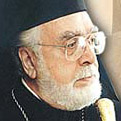Abp Iakovos Falls Asleep in the Lord
Warning: Undefined property: linknotes::$are_links in /var/www/vhosts/basil/kbsite/blog/wp-content/plugins/linknotes.php on line 73
 Recent converts may not recognize the name of his emminence Archbishop Iakovos (Jacob), but it was synonymous with the Greek Orthodox Archdiocese of North and South America for several decades. That is, until he advocated uniting the jurisdictions of American Orthodoxy at a conference of 29 bishops at Ligonier, Pennsylvania, in 1994. At that point, he became the target of his all-holiness Patriarch Bartholomew‘s wrath, who forced him to resign in 1996.
Recent converts may not recognize the name of his emminence Archbishop Iakovos (Jacob), but it was synonymous with the Greek Orthodox Archdiocese of North and South America for several decades. That is, until he advocated uniting the jurisdictions of American Orthodoxy at a conference of 29 bishops at Ligonier, Pennsylvania, in 1994. At that point, he became the target of his all-holiness Patriarch Bartholomew‘s wrath, who forced him to resign in 1996.
Abp. Iakovos fell asleep in the Lord yesterday of a pulmonary ailment. It is perhaps understandable that the venerable OCA.org website still has a photo of the Tome of Autocephaly. OK, it’s not really understandable at all, but the webmaster has amply demonstrated that nothing on that site is understandable any longer.
It would be interesting for the Orthodox Church in America to glorify Iakovos. I cannot imagine that the Ecumenical Patriarchate ever will.
In any case: Memory Eternal! (HT: A World of Speculation)
